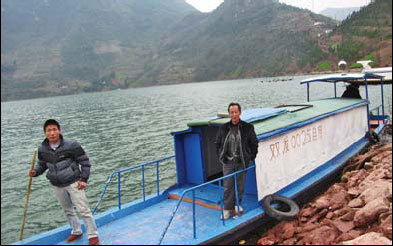Man tells of days hauling boats on Yangtze River
Updated: 2012-02-08 07:57
By Luo Wangshu (China Daily)
|
||||||||
|
Boat tracker Dai Chenzhong (right), 66, and his neighbor Deng Yigang are on a motorboat on the Yangtze River in Xialong village, Chongqing. Luo Wangshu / China Daily |
CHONGQING - On first glance, Dai Chenzhong's bone-thin physique may lead one to believe him frail, but the 66-year-old spent decades of his life hauling large cargo vessels by rope along the Yangtze River.
Dai worked as a boat tracker, an exhausting and potentially dangerous job.
"It was something that required brute strength, yes, but that alone," Dai said at his home in Xialong village, which sits at the entrance to Wuxia Gorge, one of the famous Three Gorges in Southwest China. "You needed a lot of skills to do what we did."
When outboard motors became available in the 1980s, boat trackers became a thing of the past. Today, they are seen only occasionally along the river during festivals and cultural events.
However, Dai can still remember a time when being pulled by trackers along the Yangtze was the only way for people to travel from village to village in the mountainous Wushan county. Due to the area's rich mining resources, his services were vital for companies that wanted to ship their goods.
"I was 15 or 16 when I started," said the retiree, explaining that his father also worked as a tracker. "He died in 1964, when I was teenager. I can't even remember us tracking together, but we did. It was so long ago.
"My father looked exactly like the people you see in those old paintings," he said, referring to classic works such as Ilya Repin's Trackers on the Volga River.
Dai said that boats crews worked in teams with a first, second and third master. The first master was the most essential because he sat in the boat and steered it along the safest route, he said.
"It was a key role. He had to guide the boat past jagged rocks and whirlpools," he said, adding that first masters were often the most experienced boatmen and the most familiar with the Yangtze River.
"My tracker days were dangerous," Dai said. "If the boat got caught in a whirlpool, it could have sucked the boat and all the trackers down with it. The same thing would have happened if the halter broke. With a swift current, it wasn't easy to find a body if people went under."
Trackers communicated with their own slang, a tradition that has survived among modern boatmen on the waterways today.
"For example," he said, "we would say 'che yi jiao yo wei da' (be quick) when we wanted someone to speed up or do something quickly. You still hear people on the river saying that, even now."
His gravely voice then filled the room as he belted out "hey zo, hey zo, hey zo, hey zo", the chorus of a traditional tracker tune.
Dai's days as a tracker finally came to an end when his family invested in a motorboat in the late 1980s. He successfully applied for a license from Wushan shortly after.
"All the families in the village were making the switch. Motorboats were a lot easier to control and saved a lot of energy," he said. "At the time, tracking was a disappearing profession. Now the only time they are used is to attract tourism."
"Boatmen today can't be called trackers," he said, adding that he feels motorboats have made some people lazy. "(Modern boatmen) just use their vessels to fish, although some still transport goods. People prefer to take cars, trains and buses rather than ride the river nowadays."
The pensioner has two sons, both of whom are in their 40s. One worked briefly as a tracker with Dai and now runs the family boating business, and the other works in insurance.
"If I had had a choice, I would have preferred both of my sons had gone to school and didn't have to work on the boat," said Dai with a slight shake of the head.
Deng Yigang, one of Dai's neighbors, said he used to be a migrant worker based in Guangdong province. However, in 2003, he returned and started a small business that today involves taking tourists through the picturesque Wuxia Gorge.
"I often tell visitors vivid tales of the trackers who once worked this famous river," he said. "They are always amazed and enthralled."
China Daily
(China Daily 02/08/2012 page7)

 Relief reaches isolated village
Relief reaches isolated village
 Rainfall poses new threats to quake-hit region
Rainfall poses new threats to quake-hit region
 Funerals begin for Boston bombing victims
Funerals begin for Boston bombing victims
 Quake takeaway from China's Air Force
Quake takeaway from China's Air Force
 Obama celebrates young inventors at science fair
Obama celebrates young inventors at science fair
 Earth Day marked around the world
Earth Day marked around the world
 Volunteer team helping students find sense of normalcy
Volunteer team helping students find sense of normalcy
 Ethnic groups quick to join rescue efforts
Ethnic groups quick to join rescue efforts
Most Viewed
Editor's Picks

|

|

|

|

|

|
Today's Top News
Health new priority for quake zone
Xi meets US top military officer
Japan's boats driven out of Diaoyu
China mulls online shopping legislation
Bird flu death toll rises to 22
Putin appoints new ambassador to China
Japanese ships blocked from Diaoyu Islands
Inspired by Guan, more Chinese pick up golf
US Weekly

|

|








